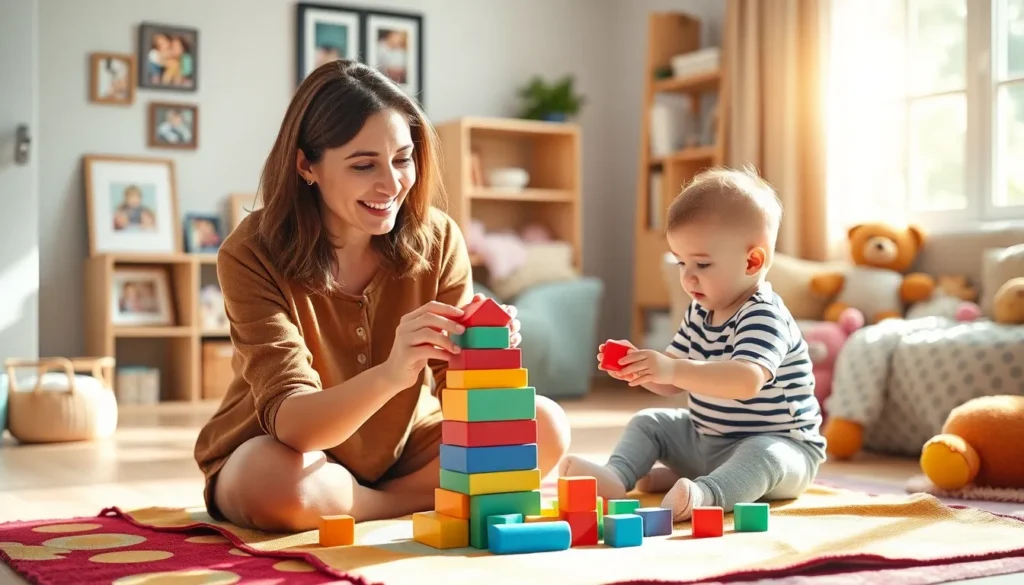Table of Contents
ToggleIn a world where parenting often feels like a team sport, solo parenting is like playing one-on-one basketball—challenging, exhilarating, and sometimes a little chaotic. But let’s set the record straight: being a solo parent doesn’t mean being single and lonely. It’s about embracing independence while juggling the delightful (and sometimes messy) moments of raising kids on your own terms.
Understanding Solo Not Single Parenting
Solo not single parenting refers to the act of raising children independently without relying on a partner or co-parent. This approach emphasizes personal strength and fulfillment in the parenting journey.
Definition of Solo Not Single Parenting
Solo not single parenting defines a specific parenting style where one individual assumes full responsibility for their child’s upbringing. This concept highlights independence, focusing on the parent’s ability to manage all aspects of parenting without a partner’s involvement. Parents in this category often embrace their role, fostering strong emotional connections with their children while navigating challenges and joys alone. It underlines the importance of community support and self-reliance in creating a nurturing environment.
Differences from Traditional Single Parenting
Differences between solo not single parenting and traditional single parenting become evident in several key areas. Traditional single parenting includes situations where the parent actively engages with another co-parent, regardless of their relationship status. Solo not single parenting lacks such a partnership, emphasizing independence in child-rearing decisions. Stability often results from this approach, as the parent navigates parenting alone without conflicting co-parenting dynamics. Embracing solo not single parenting can lead to unique challenges, including limited support, yet it also fosters resilience and creativity in parenting practices.
The Challenges of Solo Not Single Parenting


Solo not single parenting presents unique hurdles that can impact emotional and logistical aspects of family life. Each challenge requires adaptability and resilience.
Emotional Challenges
Emotional challenges often arise due to the absence of a co-parental support system. Parents frequently experience feelings of isolation and stress from carrying full responsibility for their children. Anxiety may stem from the constant need to make decisions alone. Additionally, coping with fatigue can become overwhelming, often leading to emotional burnout. As a result, maintaining a balanced emotional state is crucial for effective parenting. Finding outlets like support groups or counseling can provide relief and foster a sense of community.
Logistical Challenges
Logistical challenges emerge when managing daily responsibilities alone. Tasks such as transportation, childcare, and household management require careful planning. Coordinating schedules becomes essential, particularly when juggling work and children’s activities. Financial strain often accompanies solo not single parenting, as one income must cover all expenses. Additionally, the sheer volume of tasks can lead to stress and decreased efficiency. Implementing organizational tools and seeking help from friends or family can alleviate some of these burdens.
The Benefits of Solo Not Single Parenting
Solo not single parenting offers unique advantages that enhance the parenting experience. These benefits manifest in various forms, fostering personal growth and strong family dynamics.
Independence and Self-Reliance
Independence emerges as a significant benefit of solo not single parenting. Caregivers often develop problem-solving skills by managing all aspects of their children’s lives. Self-reliance naturally follows, encouraging individuals to trust their instincts and capabilities. This approach nurtures individual growth while modeling strength for children. Children learn resilience and adaptability, essential traits for navigating life’s challenges. Resources such as local parenting organizations or online communities provide additional support, promoting collaboration among solo parents.
Strong Parent-Child Bond
A profound bond often develops between solo not single parents and their children. This relationship thrives due to the shared experiences of overcoming challenges together. Increased one-on-one time fosters deeper emotional connections and understanding. Parents can cultivate trust through open communication, facilitating an environment where children feel safe expressing themselves. Unique family traditions can also emerge, reinforcing the bond further. By engaging in activities that interest both the parent and child, they create lasting memories that strengthen their relationship. Solo not single parenting thus enhances family unity and emotional well-being.
Tips for Successful Solo Not Single Parenting
Solo not single parenting requires effective strategies for navigating daily challenges. Prioritizing time management and building a supportive network can significantly enhance the parenting experience.
Time Management Strategies
Creating a clear schedule aids in balancing daily responsibilities. Utilizing planners or digital calendars helps track appointments, activities, and deadlines. Setting specific days for chores ensures no task becomes overwhelming. Allocating time for self-care is vital; caregivers must recharge to remain effective. Establishing routines for mornings and evenings contributes to smoother transitions in daily life. Including children in some responsibilities teaches them valuable skills while fostering teamwork. Streamlining errands into a single outing saves time and energy. Recognizing personal limits prevents burnout and encourages a healthier family dynamic.
Building a Support Network
Establishing a support network strengthens solo not single parenting. Connecting with local parenting groups can provide emotional support and practical advice. Utilizing online communities opens doors to shared experiences with others in similar situations. Inviting friends and family to participate in activities fosters a sense of inclusion. Relying on trusted individuals for occasional childcare allows for necessary breaks when stress accumulates. Participating in community events creates opportunities to meet fellow parents and expand social circles. Prioritizing communication with those around helps build understanding and support systems tailored to individual needs. Developing these connections can lead to lasting friendships and shared parenting resources.




